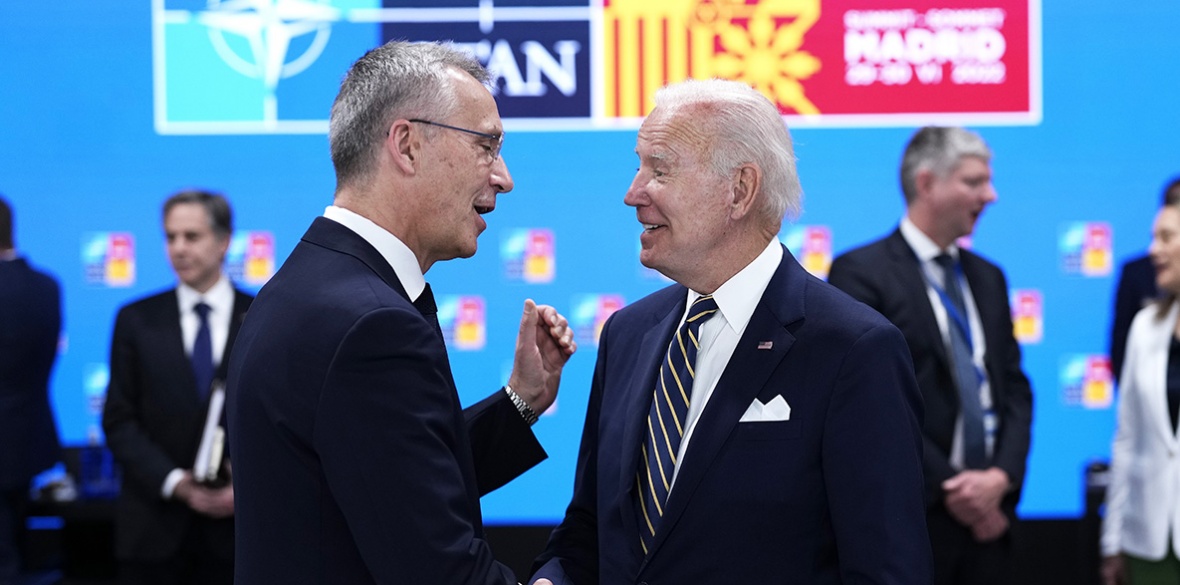This is the last article you can read this month
You can read more article this month
You can read more articles this month
Sorry your limit is up for this month
Reset on:
Please help support the Morning Star by subscribing here
NATO’s Madrid conference feels like a war summit. Despite recent statements from Ukraine’s President Volodymyr Zelensky and from Nato secretary-general Jens Stoltenberg himself that the war in Ukraine would have to end in negotiations, the mood has changed.
In Madrid there has been no talk of diplomacy, no discussion of moves to peace, only preparations for war.
Every summit announces a “strategic concept.” This time the conference really marks a historic reshaping of the West’s military posture.
Stoltenberg was clear in his opening comments that the summit would involve “the biggest overhaul our collective defence since the end of the cold war.”
He promised more forward-deployed combat formations, more high-readiness forces and more prepositioned equipment.
Even before Western leaders gathered, Stoltenberg had announced a massive increase in the number of Nato troops in Europe on high alert, from 40,000 to 300,000.
Pre-announced too was an agreement that Finland and Sweden would join the alliance, a move which marks a significant shift as the Nordic countries abandon their decades-long formal neutrality.
This involved the Finnish and Swedish governments agreeing to a set of Turkish demands to prevent recruitment, fundraising and propaganda activities of the Kurdish organisations in their countries.
It meant promising to change their laws to facilitate the extradition of Kurdish activists and lifting all restrictions on the sale of weapons to Turkey.
The Turkish government, which has been fighting a murderous war against the Kurds for decades, said it had “got what it wanted” including “full co-operation in the fight against” the rebel groups.
This shameful agreement was made despite the fact the vast majority of Finns oppose their government making any concessions to Turkey in order to join up.
At the summit itself President Joe Biden announced a sharp expansion in US military deployments in Europe including setting up a permanent headquarters for the US 5th Army Corps in Poland — a move that Russian President Vladimir Putin has long resisted.
Biden also announced the deployment of two more F-35 fighter jet squadrons to Britain. Meanwhile new “air defence and other capabilities” will be sent to Italy and Germany, and additional rotational deployments will be set up in Romania and the Baltics.
Not to be outdone, Boris Johnson announced that Britain’s military presence in Estonia, which borders Russia, will be bolstered.
He called on all Nato countries to follow Britain and increase military spending to at least 2 per cent.
“The Nato alliance keeps our people safe every day. But over the next 10 years, the threats around us are only going to grow.
“We need allies — all allies — to dig deep to restore deterrence and ensure defence in the decade ahead.”
The target, he said, “was always meant to be a floor, not a ceiling, and allies must continue to step up in this time of crisis.”
Nato is, in other words, responding to the horrific Russian invasion of Ukraine in the most confrontational and provocative way possible, by radically broadening and deepening its alliance in moves that can only confirm the Russian elite’s sense of Nato as a hostile and threatening force.
The political background noise is alarming. British leaders in particular are almost daily talking up war.
The new chief of staff in Britain General Patrick Sanders called this a “1937 moment” in a speech on Tuesday, referring to the run-up to the second world war.
He went on to say that British troops must be prepared to “fight and win” in Europe. British Defence Secretary Ben Wallace has been pushing for higher military spending than even Johnson is looking for and Foreign Secretary Liz Truss has said that the West needs to learn lessons from the Ukraine war for future battles over Taiwan.
This is the barely concealed subplot. Western leaders are adopting this reckless attitude to the war in Ukraine not because they care about the Ukrainian people any more than they cared about the Afghans, the Iraqis or the Libyans when they smashed up their countries.
As the US Defence Secretary Lloyd Austin has admitted, the West is first of all fighting a proxy war against Russia in order to weaken it, and if possible bring down Putin’s regime.
Second, they are using the war in Ukraine as cover for tooling up for the confrontation that matters most to them, with China.
The Ukrainian people will be the first to suffer from these policies. Along with Putin, Nato is doing its bit to condemn the Ukrainian people to a prolonged and bloody war of attrition.
Its attitude is also clearly increasing the risk of terrifying escalation. The whole movement needs to redouble its efforts to force world leaders from the road to war.
That’s why the Stop the War Coalition helped organise a day of action against the war and against Nato last weekend and we will be stepping up our campaign in the weeks and months ahead.
Chris Nineham is vice-chair of the Stop the War Coalition.











